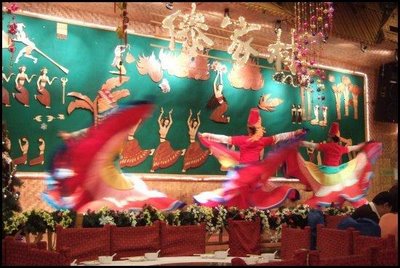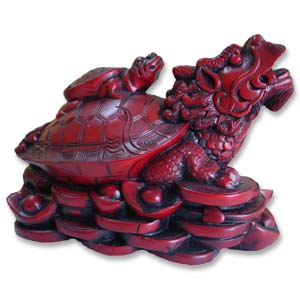In Feng Shui, the windows of your house are the eyes of your home.
The doors are the "mouths". Windows allow you to look out, and breathe in Chi, or vital energy. Windows also let in the welcome warmth and sunshine - the Yang Chi.
If you have a room that has too much yin and is dark, foreboding, and depressing, install an extra window if possible, or make an existing window opening larger. If renovations to your windows are not possible, you can paint the room a sunlight yellow or hang a mirror opposite a window to "create" another window. Other enlivening elements include bright colors, lights, crystals, flowers and plants. Wherever possible have two windows that open in each room. From a practical point of view, this creates cross ventilation and a more even distribution of light and Chi.
Privacy is vital to a sense of well being. Make sure that your window coverings, plants or ornaments screen the inside of your home. If "poison arrows" of negative Sha Chi are aiming towards your house - such as pointy rooftops, corners of buildings, etc - it is best to place a plant, vase or statue on your windowsill to help prevent the negative Sha Chi from entering. The very best cure is an octagonal Bagua Mirror which will bounce the negative energy away from your home.
A good view is even better Feng Shui. It not only serves to increase the value of a property but brings about Sheng Chi (the most auspicious Chi). If you have a blank wall outside of your windows, this will generate negative Sha Chi. Plant some colorful flowers, creeping vines, or shrubbery. Install window boxes and fill them with cheery flowers. Spring for pretty curtains, and other smart decorating details which can detract from even the most gloomy outlook. You might consider install "faux" stained glass windows (decorative window film from Home Depot - $19.97) to block an ugly view. They not only let light in, they are colorful and gorgeous.
Your windows are your outlook on life.
Your doors, on the other hand, are the "mouths" of your home.
There is generally a suggested ratio of "eyes" to "mouths" (windows to doors). If you think about it, you certainly wouldn't want to have 5 mouths to every pair of eyes! This would mean that the occupants of the house would constantly be bickering, yelling, and fighting. Do a quick count and see what you're working with.
Go outside to the street and make your way towards your door. Is it easy to find or do you have to meander around the side of the house looking for it? Does it feel safe? Is it well lit at night? Does it look appealing or scary? Does the door look happy or tired? Is it greeting people, or is it saying "Go away," or "I’ve got something to hide," or "My owner doesn’t care about me."
Here are some quick tips for creating a great "mouth" for your house:
Moving objects (flags, whirligigs, etc.), sounds (chimes) and color (fresh coat of paint or colorful flowers) can easily attract people and chi toward a door. Shiny objects can catch the eye of guests too. A fountain outside the door is the ultimate. Face it - everyone's #1 gripe is not being able to see house numbers at night!
A red door (I suggest "Heritage Red" by Benjamin Moore - a classic beauty) can be used to welcome guests. Believe it or not, homes with red doors get broken into much less often than homes without red doors. A red door says "My owner cares about me - so watch out!".
Bonus House Tip of the Month:
Check ALL doors for squeaks, and stickiness. Use WD40 to banish squeaks and sand down sticky doors as necessary. Don’t forget closet and cabinet doors! Anything that doesn't work in your home represents your life not working. Don't let these things go!
To get a free estimate on a full-blown Feng Shui Consultation, visit our website, Feng Shui Style.
Tips, tricks, and all the latest on Feng Shui, by Jennifer A. Emmer, owner of Feng Shui Style in the Bay Area. Our corporate office is in downtown San Jose, California.
Tuesday, December 08, 2009
Friday, July 17, 2009
Feng Shui revival defies prohibition in China

(Xinhua) Updated: 2006-08-31 22:57
BEIJING -- Feng Shui is gaining popularity in China's affluent coastal cities including Guangzhou, Shanghai and Shenzhen, although it is still illegal. Many Feng Shui masters have established consultancy firms, offering advice on issues such as career, marriage, health, debt, investment, study and names according to Feng Shui principles. More than 1,000 Feng Shui guides work in agencies in Shanghai, according to Wang Xiaohe, manager of a Shanghai-based Feng Shui company.
"Feng Shui is widely applied in interior decorating and real estate, so it has attracted many estate agents and entrepreneurs," says Wang. Feng Shui is the ancient practice derived from the ideas in the Book of Changes, an ancient Chinese divination and philosophical manual.
It involves ensuring a good flow of energy, or qi. Buildings and other structures need to face certain directions depending on their surroundings. Elements such as wood, fire and earth have to be carefully balanced. It is necessary to avoid random and haphazard arrangements of furniture and accessories according to Feng Shui guides. Wang says many entrepreneurs will consult on the future of their businesses, while estate agents are more likely to consult on the position of furniture and the environment of their projects.
Consultants usually charge 30 yuan (US$3.75) per square meter for property advice and 300 yuan (US$37.5) per half hour for other services. Advice on the name of a person or a company can cost from 800 to 1,800 yuan (US$225), Wang said, adding prices are negotiable according to the customer's means. The influx of residents from Hong Kong, Macao and Taiwan, where Feng Shui is legal and commonly used, has contributed to its popularity, says Zhang Zhizhe, chairman of the Shanghai Yi Jing Institute.
"My company is small, but we have long-term clients and have already made a lot of money," says Li Xiuxia, manager of another Shanghai-based consultancy, adding it planned to advertise to attract more customers. The Yi Jing Institute is trying to list Feng Shui as a world intangible cultural heritage, but as long as it remains illegal, this could prove to be difficult.
"Feng Shui guides usually start out as consultancy companies, otherwise the administrations of industry and commerce would prohibit them from operating as the public practice of Feng Shui is illegal," says Zhang.
Professor Yu Wujin, of Fudan University philosophy department, says, "They change the name from 'Feng Shui' to 'consultant' to avoid being considered 'superstitious' by the public, but it also suggests a wider and more modern definition of 'Feng Shui'." Yu believes the consultants are exploiting modern anxieties in a competitive society. "In a market economy, people wish to lower the risk of failure and danger in their lives and work and turn to the Feng Shui masters for help."
The practice of Feng Shui was made illegal after the founding of the People's Republic of China in 1949 as the new government determined to eliminate the "four olds", namely the old ideas, old culture, old customs and old habits. The Shanghai Administration of Industry and Commerce could give no numbers or identities of consultant companies involved in Feng Shui practice, but said their businesses were legal in terms of the registration procedure. Feng Shui is a part of China's traditional culture, which has never really died out, says Zhang Zhizhe. "Feng Shui guides solve modern problems in a traditional way."
To get a free estimate on a full-blown Feng Shui Consultation, visit our website, Feng Shui Style.
Tuesday, March 10, 2009
The History of Feng Shui
Introduction
 Originating in China almost 6,000 years ago, Feng Shui literally means "wind"(Feng) and "water"(Shui). Feng Shui is also referred to as "Geo-mancy" or "Earth Wisdom".
Originating in China almost 6,000 years ago, Feng Shui literally means "wind"(Feng) and "water"(Shui). Feng Shui is also referred to as "Geo-mancy" or "Earth Wisdom".
It is an ancient method of constructing and optimizing residences to bring about happiness, abundance and harmony. It includes architecture, urban planning, interior design, garden design, and placement of objects in our environment. It also involves the layout, framework, materials and colors of building structures. These rules of thumb allow us to make the most ideal arrangement in any given situation.
In ancient China, farms and villages were auspiciously placed within the protective folds of mountains, shielded from harmful winds and nurtured by the gentle, winding streams. The people who practiced these principles prospered in agriculture and trade and grew strong and powerful. They produced social, cultural and military leaders unlike their neighbors who were exposed to harsh winds and inhospitable terrain. The art of Feng Shui was refined over many centuries, producing an abundance of learned scholars.
Traditionally, Feng Shui was considered a highly guarded secret of the Chinese Imperial Court. All Feng Shui Masters were forbidden to release their potentially powerful knowledge to outsiders. The practice of Feng Shui was considered so powerful that it would be devastating in the hands of the enemy. Consequently, knowledge was handed down from father to son within family traditions. The turbulent history of China has only helped to reinforce this tendency and this secrecy often continues, even today.
The Lo Shu Turtle has been said to bring eight different types of heavenly blessings but it is very attuned towards bringing wealth luck. When it is depicted with a baby as it is shown here, it is said to be especially powerful.
To get a free estimate on a full-blown Feng Shui Consultation, visit our website, Feng Shui Style.
 Originating in China almost 6,000 years ago, Feng Shui literally means "wind"(Feng) and "water"(Shui). Feng Shui is also referred to as "Geo-mancy" or "Earth Wisdom".
Originating in China almost 6,000 years ago, Feng Shui literally means "wind"(Feng) and "water"(Shui). Feng Shui is also referred to as "Geo-mancy" or "Earth Wisdom".It is an ancient method of constructing and optimizing residences to bring about happiness, abundance and harmony. It includes architecture, urban planning, interior design, garden design, and placement of objects in our environment. It also involves the layout, framework, materials and colors of building structures. These rules of thumb allow us to make the most ideal arrangement in any given situation.
In ancient China, farms and villages were auspiciously placed within the protective folds of mountains, shielded from harmful winds and nurtured by the gentle, winding streams. The people who practiced these principles prospered in agriculture and trade and grew strong and powerful. They produced social, cultural and military leaders unlike their neighbors who were exposed to harsh winds and inhospitable terrain. The art of Feng Shui was refined over many centuries, producing an abundance of learned scholars.
Traditionally, Feng Shui was considered a highly guarded secret of the Chinese Imperial Court. All Feng Shui Masters were forbidden to release their potentially powerful knowledge to outsiders. The practice of Feng Shui was considered so powerful that it would be devastating in the hands of the enemy. Consequently, knowledge was handed down from father to son within family traditions. The turbulent history of China has only helped to reinforce this tendency and this secrecy often continues, even today.
The Lo Shu Turtle has been said to bring eight different types of heavenly blessings but it is very attuned towards bringing wealth luck. When it is depicted with a baby as it is shown here, it is said to be especially powerful.
To get a free estimate on a full-blown Feng Shui Consultation, visit our website, Feng Shui Style.
Subscribe to:
Posts (Atom)

